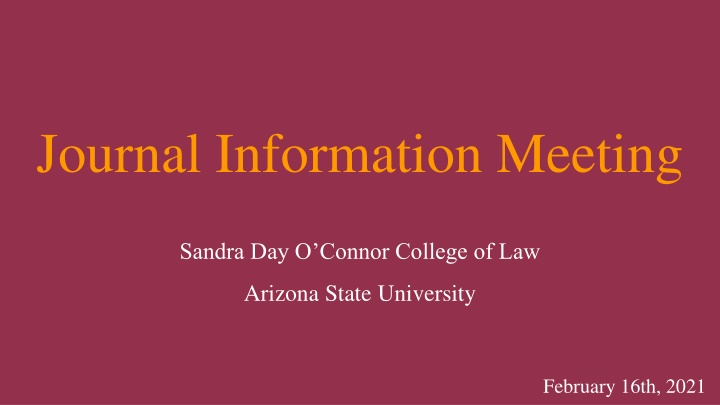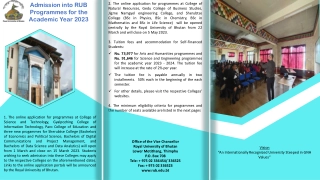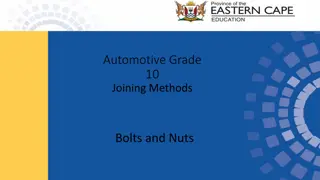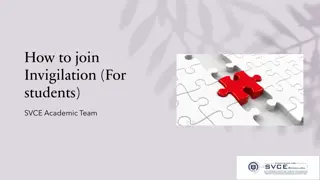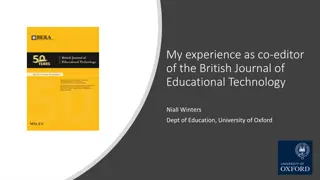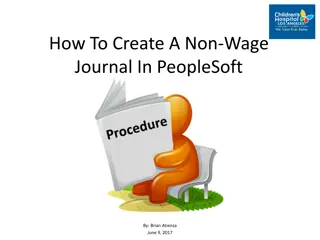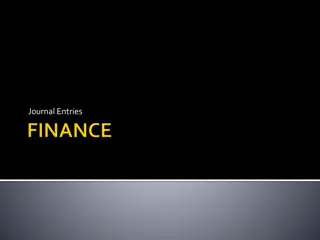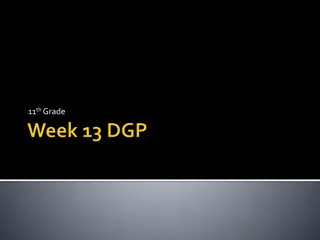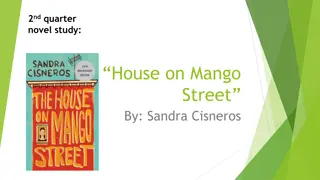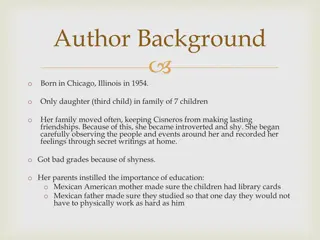Joining a Law Journal at Sandra Day O'Connor College of Law
Law journals at Sandra Day O'Connor College of Law offer valuable opportunities for students to enhance their legal skills, gain employment advantages, and build professional networks. Membership in a law journal provides leadership experiences, clerkship opportunities, and the chance to improve as a legal writer while connecting with industry professionals. Learn about the Write-On Competition process and how to prepare for it.
Download Presentation

Please find below an Image/Link to download the presentation.
The content on the website is provided AS IS for your information and personal use only. It may not be sold, licensed, or shared on other websites without obtaining consent from the author.If you encounter any issues during the download, it is possible that the publisher has removed the file from their server.
You are allowed to download the files provided on this website for personal or commercial use, subject to the condition that they are used lawfully. All files are the property of their respective owners.
The content on the website is provided AS IS for your information and personal use only. It may not be sold, licensed, or shared on other websites without obtaining consent from the author.
E N D
Presentation Transcript
Journal Information Meeting Sandra Day O Connor College of Law Arizona State University February 16th, 2021
What is a law journal? Student-run organization that publishes scholarly articles from professors, legal scholars, and students across the country and world Journals might also organize various symposiums and other events that focus on specific topics Often cited by legal scholars, courts, and other legal entities Of course, getting cited improves the prestige of a law journal Sandra Day O Connor College of Law Arizona State Law Journal Corporate & Business Law Journal Jurimetrics: The Journal of Law, Science, and Technology Law Journal for Social Justice Sports and Entertainment Law Journal
Why join a law journal? Employment opportunities Many employers prefer to see a law journal membership on a resume Practicing attorneys often served on a law journal themselves during law school Employers know that being on a law journal provides one with a valuable set of skills Leadership opportunities Get involved and apply for leadership positions Clerkship opportunities Connect with clerks and judges Find a mentor who can provide tips about the process Create a strong writing sample Networking with attorneys and other legal or business professionals Master the Bluebook & become familiar with the Redbook Improve as a writer Connect with other students who are going to be your future colleagues & friends
How? The Write-On Competition 2021 Write-On Exam at-home exam after Spring final exams Start: Monday, May 10th at 8AM Finish: Tuesday, May 11th at 5PM 33 hours? Yes! Part I: Bluebook Citation Exam 50 multiple choice questions Bluebook offers a free online 30-day trial Part II: Closed-Universe Memorandum No research allowed, materials will be provided Grading & Application Process Exams are anonymously graded, using your ASU Law exam numbers Each journal uses specific criteria to determine whom to extend an invitation You can apply for multiple journals Selection process will be explained later
How to prepare in the meantime? No need to stress! If you want to get started now, you can do the following: Look through your Bluebook and tab rules as you go Remember: law journals use the Whitepages, not the Bluepages Lexis Interactive Citation Workstation (Practice questions) Review your first semester memorandums understand CREAC, IRAC, etc. Attend mandatory second meeting via Zoom on March 30th at 12:15 PM Attend a meeting hosted by the Arizona State Law Journal, and learn some useful tips on using the Bluebook other journals may be hosting similar events Turn in mandatory Grade Release Form more information coming soon Always watch out for announcements using Daily Disclosure, Facebook, GroupMe, etc.
Arizona State Law Journal (ASLJ) Established in 1969, the Arizona State Law Journal is a nationally recognized legal periodical that serves as the primary publication of the Sandra Day O Connor College of Law at Arizona State University. Routinely cited in major textbooks, treatises, and opinions at all levels of the state and federal judiciary, including the United States Supreme Court High standards and excellent reputation for over 50 years Emphasis on citation and writing skills Highly regarded for post-graduate employment and clerkships Time Commitment: 6-8 hours per week (CCs, N&C, Blog, Committees) Editor-in-Chief: Delilah Cassidy
Arizona State Law Journal Grading Criteria 35 - 40 Staff Writers Only requirement is the Write-On Competition Grading Criteria: Bluebook Exam (25%) Memorandum (25%) GPA through Spring (45%) Legal Writing Grades (5%) Legal Method & Writing Grade (2.5%) Legal Advocacy Grade (2.5%)
Corporate & Business Law Journal (CABLJ) Publish articles and comments on a variety of influential and novel topics pertaining to corporate and business law, including: Corporate governance Securities regulation Capital market regulation Employment law Mergers and acquisitions As these practice areas have historically been heavily influenced by east coast institutions and practitioners, CABLJ offers a unique opportunity for students, scholars, and the Arizona community as a whole to engage in the exchange of ideas and information surrounding these topics. Time Commitment: Varies widely, front-loaded, 6-8 hours/week to start
CABLJ Grading Criteria Approximately 35 Associate Editors Application Requirements: Write-On: 1L Writing Grades and GPA through Spring 2021: 20% Statement of Interest: 15% 250 words Experience or interest in corporate and business law How your background and skills will contribute to CABLJ Why you want to join a law journal Resume: 25% Bluebook Exam: 25% Closed Memorandum: 15% Contact Raynee Cooper at rscoope2@asu.edu with any questions.
Jurimetrics: The Journal of Law, Science, and Technology Jurimetrics, published quarterly, is the journal of the ABA Section of Science & Technology Law and the Center of Law, Science & Innovation. Jurimetrics is the oldest journal of law and science in the United States, and it enjoys a circulation of more than 8,000 including ABA members. Is the No. 1 peer-reviewed law journal for science, technology, engineering, and math fields in the United States. Highly regarded for post-graduation employment and clerkships. We publish multiple student pieces each year. Associate Editors are not required to write their note/comment on a topic involving law, science, or technology. Editor-in-Chief: Sara Kizer (sykizer@asu.edu)
Jurimetrics Grading Criteria This information is subject to change by the next executive board, but here is an estimate of what can be expected: 30-35 Associate Editors, 4-8 hours of work a week. Grading: Closed Memo: 20% Bluebook Exam: 25% GPA through the Spring: 15% 1L Writing Grades: 10% Statement of Interest: 15% Resume: 15%
Law Journal for Social Justice (LJSJ) The Law Journal for Social Justice ( LJSJ ) is the first student-run and student-created online journal at ASU Law. LJSJ aims to edit, publish, and produce notable works focusing on social justice issues through its online blog from legal scholars, practitioners and law students. LJSJ is acutely aware that with the privilege of membership in the legal profession comes the responsibility to rectify injustices. We recognize our duty to educate the community on a local and national scale about their legal rights and remedies so that real change is implemented. Time Commitment: 3-8 hours per week depending on familiarity with the Bluebook
LJSJ Grading Criteria LJSJ will be accepting approximately 20 Associate Editors *Grading: Written Memo: 15% Bluebook Citation Exam: 20% GPA: 10% Resume: 25% Statement of Interest & Skills Inventory: 30%
Sports and Entertainment Law Journal (SELJ) The Arizona State Sports and Entertainment Law Journal (SELJ) is edited by law students of the Sandra Day O Connor College of Law at Arizona State University. As one of the leading sports and entertainment law journals in the United States, the Journal infuses legal scholarship and practice with new ideas to address today s most complex sports and entertainment legal challenges. Founded in 2010, the Journal is dedicated to providing the academic community, the sports and entertainment industries, and the legal profession with scholarly analysis, research, and debate concerning the developing fields of sports and entertainment law. The Journal also seeks to strengthen the legal writing skills and expertise of its members. The Journal is supported by the Sandra Day O Connor College of Law and the Sports Law and Business Program at Arizona State University. SELJ publishes biannually in the spring and fall in both digital and print format. Each issue contains essays and articles, as well as notes or comments on the latest topics in sports and entertainment law authored by professors, practitioners, and students. In 2020, SELJ launched a monthly podcast series highlighting executives in the sports and entertainment industries. To date, guests include professionals and executives from the following institutions: Netflix, Fox Studios, United Talent Agency, Foundation Films, Arizona Coyotes, Chicago White Sox, Arizona State University, and the University of Illinois. Additional guests include Director Oliver Butler. Oliver directed the Tony Award nominated, What the Constitution Means to Me. Podcasts can be found at www.asuselj.org.
SELJ Grading Criteria In addition to the Write-On Competition, applicants must provide: Resume Statement of Interest (not to exceed 2 pages) Grading Criteria: Resume: 10% Statement of Interest: 10% GPA (through Spring): 20% Closed Memo Response: 30% Bluebook Citation Exam: 30% For more information, please contact Alexandra Glover at amglove2@asu.edu.
Contact Information Arizona State Law Journal: delilahcassidy@gmail.com Delilah - Jurimetrics: Vanessa - vpomeroy@asu.edu Sports & Entertainment Law Journal: Brandon - bdrea@asu.edu Julieta - Law Journal for Social Justice: jcarri29@asu.edu Corporate and Business Law Journal: Noah - njsr95@gmail.com Write-On Competition Questions: Brie -
